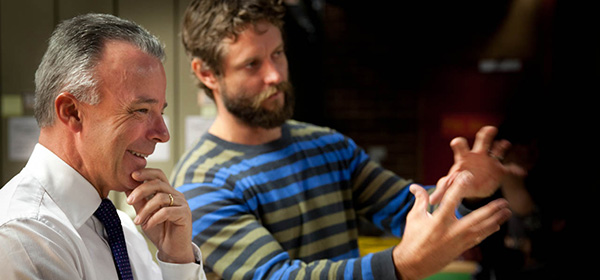Brendan Nelson’s story reveals how he’s squeezed many diverse careers of national significance into just 58 years, all in the service of others.
I grew up in Launceston, and when I was 12 or 13 my father said to me, “Look son, your mother and I don’t have any money and we don’t know people who have any influence. The only way you’re going to get anywhere in life and live in a better place is if you work as hard as you can at school.”
When I was 14, I had a challenging year and my mother said, “Look, in the end, your life is going to be judged by people and the causes to which you commit.”
Other than my parents, the major influence on me was the Jesuits. I went to the Jesuits for two years and that saved me in all kinds of ways, but most importantly, it’s a value system that I carry with me.
I thought I was going to end up as an accountant or a public servant, which is ironic given what I do now. I really wasn’t at all enthused by economics or elements of accounting, and there was nothing that I was studying that interested me.
I reached the conclusion that the people who felt the most fulfilled in their lives were those who spent them in the service of others, and I actually decided I wanted to join the police force, but when I went to apply, I was told I was too old.
I never imagined I was smart enough, but I applied for Medicine at Flinders University and got in. And I remember going to the National Press Club and sharing a platform with Moira Rainer, the very good, very left-wing human rights lawyer who said that the price we pay for the good people remaining out of politics is that we continue to be governed by people for whom we have a low regard. So I thought I’d have a go at politics.
When I was first preselected for parliament 20 years ago, Hugh McKay the social anthropologist observed, “You and I have something in common that’s a great advantage. We spend a lot of time in other people’s homes, and it’s not until you spend time in someone’s home that you understand people.”
I have been in hundreds, thousands of people’s homes, day and night, and sometimes in very desperate situations. You don’t realise what you’re learning until you’re learning it, but I learned a lot by visiting others.
My job at the Australian War Memorial (the memorial) is a labour of love, an immense privilege. It’s got more to do with our future than our past. The memorial is one of the unifying institutions in the country, and we have to make the history live. So I think the political capital is at the other end of ANZAC Parade, across the lake – but the soul of the country is here at the memorial.
I have got more things I want to do at the memorial, and people do ask me how long will I stay here. I say I don’t know, but I will know it when the time comes to leave.
In terms of retirement, my wife and I went to see a financial planner last year and one of his first questions was, “Dr Nelson, when do you plan to retire?” I replied, “The day I die.” “Really, you want to keep working forever?”, he asked. And I said, “Yeah, my intention is to work as long as I can.”
This may not be what your audience wants to hear, but it’s extremely important in life if you are able to keep both your mind and your body active. But if I am not in paid employment, I would certainly want to volunteer or do charitable work. I love riding my motorbikes, I love fishing, I love playing my guitar, and I like a game of tennis. But if I had to get up every day and think, “What am I going to do today?”, I think my life expectancy would be cut short.
We have to challenge the stereotypes about ageing. People who are older, in their 40s and 50s, are more likely to give you more reliable employment, less absenteeism, a better balance of wisdom in the workplace with younger employees, and are more likely to be loyal and remain for a longer period of time; I actually think they are more productive and efficient.
I am optimistic about the future of Australia. I am very confident, our country, my children and my grandchildren are going to have a better country than the one I have had the privilege to live in so far.
What’s also important to realise is that if all the economic and scientific problems were solved, all the important questions would still remain unanswered. Our values, our beliefs and the way we relate to one another and our place in the world is where our destiny lies. That is one of the reasons why I believe so strongly in the memorial and the stories of the men and women behind it.

